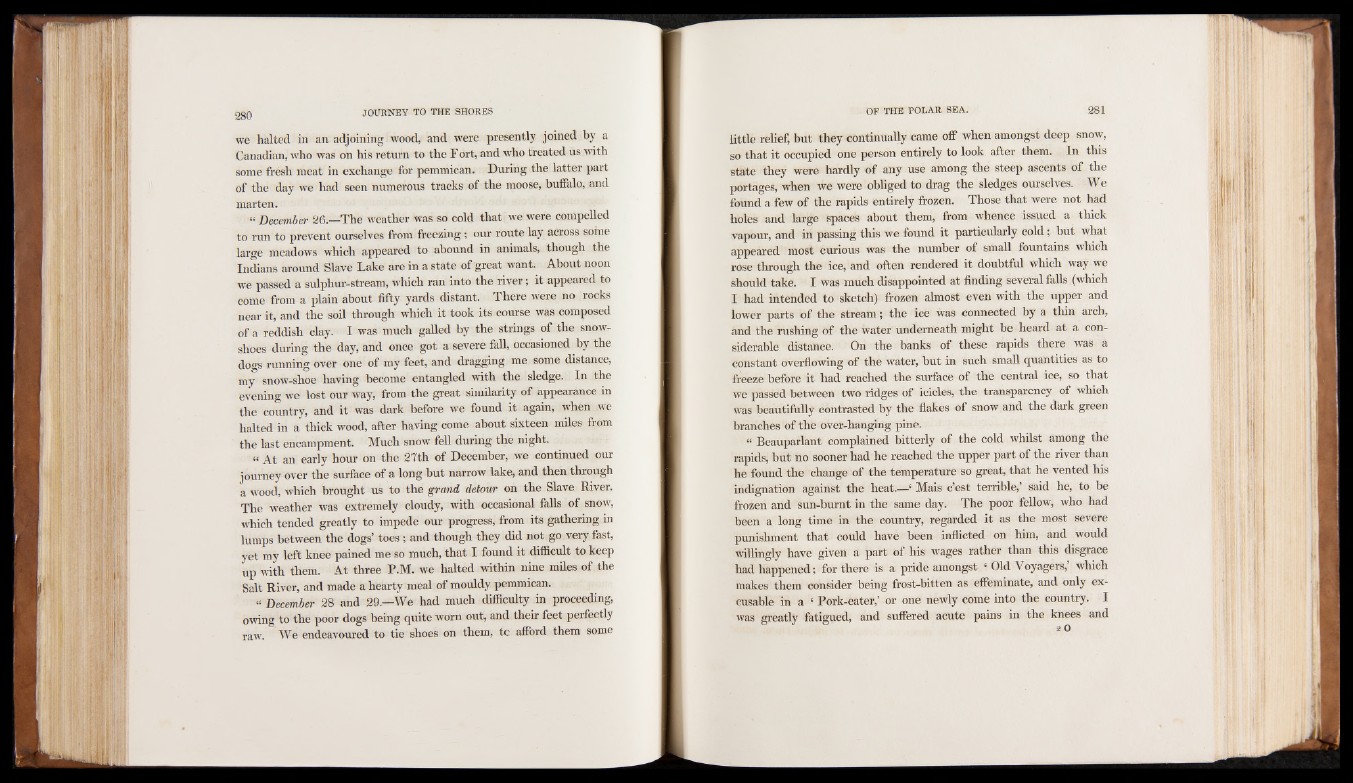
we halted in an adjoining wood, and were presently joined by a
Canadian, who was on his return to the Fort, and who treated us with
Some fresh meat in exchange for pemmican. During the latter part
of the day we had seen numerous tracks of the moose, buffalo, and
marten.
“ December 26.—The weather was so cold that we were compelled
to run to prevent ourselves from freezing ; our route lay across some
large meadows which appeared to abound in animals, though the
Indians around Slave Lake are in a state of great want. About noon
we passed a sulphur-stream, which ran into the river; it appeared to
come from a plain about fifty yards distant. There were no rocks
near it, and the soil through which it took its course was composed
of a reddish clay. I was much galled by the strings of the snow-
shoes during the day, and once got a severe fall, occasioned by the
dogs running over one of my feet, and dragging me some distance,
my snow-shoe having become entangled with the sledge. In the
evening we lost our way, from the great similarity of appearance in
the country, and it was dark before we found it again, when we
halted in a thick wood, after having come about sixteen miles from
the last encampment. Much snow fell during the night.
i At an early hour on the 27th of December, we continued our
journey over the surface of a long but narrow lake, and then through
a wood, which brought us to the grand detour on the Slave River.
The weather was extremely cloudy, with occasional falls of snow,
which tended greatly to impede our progress, from its gathering in
lumps between the dogs’ toes ; and though they did not go very fast,
yet my left knee pained me so much, that I found it difficult to keep
up with them. At three P.M. we halted within nine miles of the
Salt River, and made a hearty meal of mouldy pemmican.
« December 28 and 29.—We had much difficulty in proceeding,
owing to the poor dogs being quite worn out, and their feet perfectly
raw. We endeavoured to tie shoes on them, tc afford them some
little relief, but they continually came off when amongst deep snow,
so that it occupied one person entirely to look after them. In this
state they were hardly of any use among the steep ascents of the
portages, when we were obliged to drag the sledges ourselves. We
found a few of the rapids entirely frozen. Those that were not had
holes and large spaces about them, from whence issued a thick
vapour, and in passing this we found it particularly cold--; but what
appeared most curious was the number of small fountains which
rose through the ice, and often rendered it doubtful which way we
should take. I was much disappointed at finding several falls (which
I had intended to sketch) frozen almost even with the upper and
lower parts of the stream; the ice was connected by a thin arch,
and the rushing of the water underneath might be heard at a considerable
distance. On the banks of these rapids there was a
constant overflowing of the water, but in such small quantities as to
freeze before it had reached the surface of the central ice, so that
we passed between two ridges of icicles, the transparency of which
was beautifully contrasted by the flakes of snow and the dark green
branches of the over-hanging pine.
“ Beauparlant complained bitterly of the cold whilst among the
rapids, but ho sooner had he reached the upper part of the river than
he found the change of the temperature so great, that he vented his
indignation against the heat.—‘ Mais c’est terrible,’ said he, to be
frozen and sun-burnt in the same day. The poor fellow, who had
been a long time in the country, regarded it as the most severe
punishment that could have been inflicted on him, and would
willingly have given a part of his wages rather than this disgrace
had happened; for there is a pride amongst ‘ Old Voyagers,’ which
makes them consider being frost-bitten as effeminate, and only excusable
in a 1 Pork-eater,’ or one newly come into the country. I
was greatly fatigued, and suffered acute pains in the ksnoees and